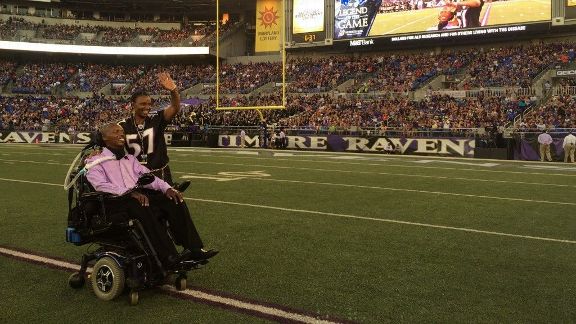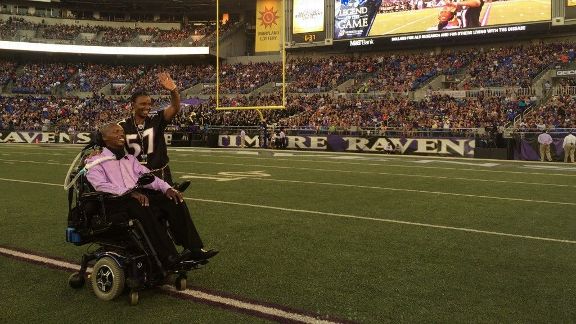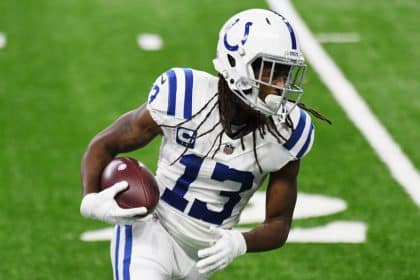
OWINGS MILLS, Md. — Before Baltimore Ravens standout Justin Tucker became the most accurate kicker in NFL history, he was a young, second-year player trying to deal with adversity.
In 2013, the Ravens lost to the Cleveland Browns, 14-6, and Tucker pushed both of his field-goal attempts — from 44 and 50 yards — wide right. He remembers the criticism and scrutiny intensifying quickly.
Tucker then received an email, which he still has pinned in his inbox a decade later.
“It’s going to be alright. Just focus on the next one. Keep your head down, keep working. You’re going to be fine.”
That show of support came from O.J. Brigance, whose words carry as much meaning as anyone in the Ravens organization.
Brigance was a special teams performer on the Ravens’ first Super Bowl championship team 22 years ago. He’s currently a special adviser to player engagement with the Ravens, but his role transcends any official title.
In 2007, Brigance was diagnosed with Amyotrophic Lateral Sclerosis, commonly known as Lou Gehrig’s Disease. It progressively attacks the nervous system and has no known cure. If you’re one of the many who received an encouraging note from Brigance, it’s from his communication device featuring built-in eye-tracking technology.
“O.J.’s message could’ve been from anyone,” said Tucker, who hit 33 field goals in a row after that email, “but the fact that it was from O.J., and given what he’s been going through a large portion of his life, it put everything instantly into perspective for me.”
Brigance’s impact extends beyond football. This year marks the 15th anniversary of the Brigance Brigade Foundation, an organization whose mission is to “equip, encourage and empower” those with ALS. The foundation has raised more than $1.8 million and has helped hundreds of families, from giving motorized wheelchairs to building ramps or porch lifts to get people to their front door.
“We have discovered quite often when difficulties impact our lives, we will be presented with the opportunity to assist others experiencing the same journey,” Brigance wrote. “That is where we all have the chance to impact the lives of others.”
Brigance’s impact can be measured by how others cherish their bond with him. Ravens coach John Harbaugh has often described Brigance as “the strongest man in the organization” and has read Brigance’s emails in the locker room following wins. When former middle linebacker Ray Lewis was handed the Lamar Hunt Trophy for winning the AFC championship in January 2013, he looked at Brigance and told him, “You’re my greatest motivation.” When former safety Ed Reed was giving his Hall of Fame speech in 2019, he delivered a shout-out to Brigance, saying, “You’re the reason why I’m here, man. You’re the reason I became a great professional.”
When Brigance was first diagnosed with ALS, he wasn’t expected to live past 40. He’s now 53.
Brigance’s birthday, which is Sept. 29, is one of the more celebrated days on the team’s calendar. Every year, players and coaches sing “Happy Birthday” to him whether it’s on the field after practice or in the cafeteria. For his 50th birthday, a sellout crowd of 70,000 fans at M&T Bank Stadium serenaded Brigance on his special day.
Brigance is among the 2% to 3% of ALS patients who live between 15 and 20 years past their initial diagnosis, according to ACL Clinical Services at Johns Hopkins Medicine.
“We believe that our assignment is not over yet,” said Chanda Brigance, O.J.’s wife. “We still have a lot more to do. That’s why we’re still here.”
It was Jan. 28, 2001, and Brigance charged down the field as one of Baltimore’s special teams aces. He made the first tackle of the 34-7 triumph over the New York Giants in Super Bowl XXXV.
About six years later — a few years after he had retired — Brigance experienced cramping in the muscle of his right shoulder while playing racquetball. He soon started losing strength and dexterity in his right arm.
On May 16, 2007, Brigance learned he had ALS, which he and Chanda knew little about. His symptoms aligned with what they researched.
O.J. and Chanda went from trying to figure out how to slow the progress to wanting to learn what could have caused it. Brigance worked out excessively. He didn’t drink or smoke.
“When we initially received the diagnosis, we were told that I should get my affairs in order because the prognosis to live with ALS is only 2 to 5 years,” Brigance wrote. “It was inconceivable to me when I was diagnosed at the age of 37 that I could be dead by the age of 40!
“To be celebrating 16 years humbles me because like so many other scenarios in my life, God has allowed me to be the exception to the rule to show that all things are possible. Every day of life is both a miracle and a blessing!”
Less than a year after the diagnosis, Brigance was in a wheelchair. A few years after that, his voice was gone. He now requires a ventilator to breathe, as well as a feeding tube.
Brigance isn’t afraid to crack jokes at his own expense. During a recent interview, he forgot to finish a sentence while using his eye-recognition software. “You can deduct five points,” he joked.
When Brigance controlled his wheelchair, he would reach nearly 4 miles per hour, and the Ravens jokingly posted speed limit signs in the hallways. But as Brigance put it, he lost his wheelchair license once he lost the use of his hands.
“With the new advancement in technology, there is a software that allows me to drive myself by eyesight,” Brigance wrote. “But I don’t quite trust myself. One wrong turn and off the curb wouldn’t be pretty.”
Brigance played his first four years in the NFL with the Miami Dolphins before Baltimore’s 2000 Super Bowl season. He then played nearly two full seasons with the St. Louis Rams before retiring. The Ravens brought him back as a player engagement liaison in 2004.
Brigance said one of the toughest moments was telling the players in 2008 that he had ALS. Brigance was starting to lose weight. He was beginning to labor when he walked. He believed it was only a matter of time before the players realized something was wrong.
He was nervous with how everyone would take the news, afraid they would interact with him differently. Chanda couldn’t watch Brigance talk to the team because she knew “it was going to be a tear bath.”
“Standing in front of the team in 2008, I explained that I have been allowed a lifetime to be the first one to defeat ALS,” Brigance wrote. “I asked that they not treat me any differently but stand with me as I attempt what man says is impossible, to defeat this disease.”
Every year, the Ravens introduce the new players to Brigance and tell his story. Players often stop by his office at the Ravens facility to talk. Others will tap him on the shoulder when they see him or give him a kiss on top of his head.
“His mind is so sharp,” Chanda said. “The only thing is he’s just in a wheelchair and he’s on a breathing machine. As far as his mind and thoughts, it’s still him.”
Coach Harbaugh talks about the special relationship between O.J. Brigance and the team. pic.twitter.com/6K1v9k9slM
— Baltimore Ravens (@Ravens) September 28, 2018
It takes Brigance 3 1/2 hours to get ready to go from his home to his office, but he has never considered it a chore. As the senior advisor to player engagement, he wants the players to take full advantage of the privilege of playing in the NFL.
“One of the most gratifying aspects of the position is when a former player comes back and shares how he has grown as a father, husband and what he’s doing now,” Brigance wrote.
Always wanting to stay connected with the team, Brigance sends Harbaugh a message before every game. It usually involves some encouraging words or a scripture verse.
“It’s always just profound,” Harbaugh said. “He’s involved.”
On his birthday last year, Brigance told the team: “I have learned that life and opportunity to do what you love is priceless. There is no place in the NFL for weak souls. Life is about pouring out all that God has instilled in us to achieve success in our respective destinies. So be bold and enjoy every memorable moment and every challenge because the process will ultimately lead to a life well-lived.”
Brigance wants to be remembered as someone who didn’t allow perceived limitations to determine his destiny.
“I pray that others can take from my legacy the spirit of resiliency!” Brigance wrote. “No matter what happens to us in life we have an opportunity to respond by helping others. When all is said and done, know that we are stronger than ALS and anything else that we may face.”










